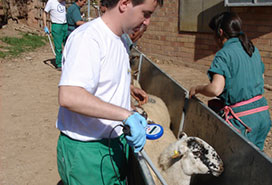TRAGSA places itself at the forefront of animal electronic identification systems
04 May 2016 | Madrid

- It starts the new R&D project “Advanced Identification Systems Applied to Animal Traceability and Production” (SIA 1618)
- Grupo TRAGSA is working for being at the vanguard in testing and adapting these identifiers, which will appear in the market within some years
The electronic identification of animal specimens through radio-frequency tags (RFID) is compulsory within the framework of the EU, and is regulated by ISO 11784 and 11785. These small-sized tags are embedded under the animals’ skin, storing information which allows to identify them individually and reliably, thus improving animal traceability and health, as well as food safety.
The growing interest shown towards this technology has led manufacturers to develop new tags, with new capabilities which will make possible to have chips that not only are readable, but also that they can record new information after being embedded into the animal and besides, stockbreeders will be able to make a remote reading of the tag. The first prototypes are expected to appear along this year, once the ISO norms which regulate their new capabilities are closed.
SIA 1618 Project
Grupo TRAGSA, with its wide and recognized experience within this field wants to be at the forefront in the testing and adaptation of these identifiers which will appear on the market in the coming years.
In this sense, the animal identification and traceability team in Tragsatec’s Production, Markets and Agri-Industries Department (Grupo TRAGSA) has begun the R&D project “Advanced Identification Systems Applied to Animal Traceability and Production” (SIA 1618), with the collaboration of manufacturing companies, both Spanish and foreign, with the aim of getting ahead with regard to the functionalities and use scenarios in the use of these new prototypes on stockbreeding animals.
The new tags, whose results will be possible to extrapolate to other species and scenarios, will include for the first time information which both stockbreeders and animal health authorities will be able to handle and consult without having to resort to a database.
TRAGSA and Grupo SEPI
TRAGSA belongs to Grupo SEPI, a corporate holding which includes a total of 16 state-owned companies in which it has direct, majority shareholding participations, with a workforce of around 73,000 professionals in 2014; the Spanish state-owned television and radio corporation, Corporación Radiotelevisión Española, which is attached to SEPI, and one public foundation. Equally, SEPI has direct minority shareholdings in a further ten companies, and indirect shareholdings in more than one hundred companies.







